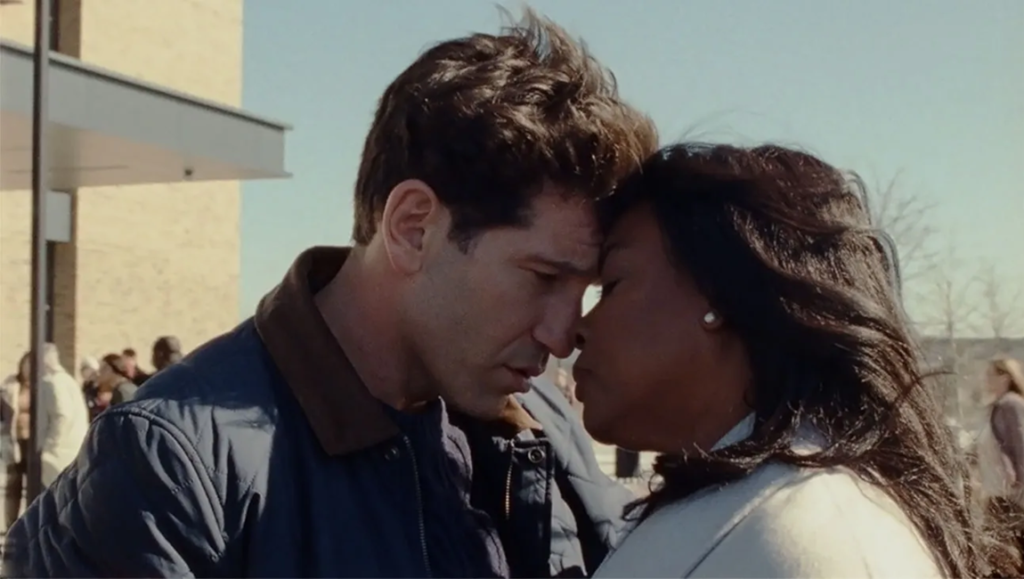Filmmaker Ava DuVernay is no stranger to explorations and dramatizations of injustice in her work. Journalist Isabel Wilkerson’s 2020 nonfiction book Caste: The Origins of Our Discontents, the source material for Origin, is prime DuVernay material. Caste is a work of social and historical comparison, tracing the parallels between the societies of the United States, Nazi Germany, and India to conclude that ingrained caste systems are the root of the oppression afflicting their most marginalized inhabitants. With Wilkerson’s text, which book critic Dwight Garner described as “almost certainly the keynote nonfiction book of the American century so far,” DuVernay seemed primed for her next documentary smash hit. Her 2016 film 13th was the director’s first outing to truly capture the zeitgeist, offering an investigation of the perverse incentives and outcomes of the prison-industrial complex that is equally stirring and enlightening for the politically uninitiated. Curious, then, that Origin opts for the biopic treatment, centering Isabel Wilkerson’s experience during her years researching for her book rather than the final product’s material. It is not a misstep in theory, but in execution the choice results in a film hamstrung by its dueling priorities and unable to satisfy either.
Isabel Wilkerson (Aunjanue Ellis) is initially reluctant when asked to pen a piece about Trayvon Martin’s killing. She and her husband, Brett (Jon Bernthal), have their hands full caring for Wilkerson’s aging mother, Ruby (Emily Yancy). After recognizing the case is receiving national attention, Wilkerson listens to a recording of Martin’s final moments, and questions why many are quick to reduce the incident to an act of racist hate when other factors complicate that narrative. Multiple personal tragedies then strike, and Wilkerson, reeling from loss, throws herself into a new project derived from her questions regarding Martin’s fate. That project would go on to become her bestseller Caste.
Across her filmography, DuVernay seeks, according to Professor Michael T. Martin, to examine both the agency and subjectivity of Black women, as well as the broader inequities specifically harming Black families and communities. Origin attempts to balance its investment in these two areas of interest, but that’s a hard tightrope to walk. Speaking to her editor, Amari (Blair Underwood), Wilkerson claims she wants to be an invaluable part of the story she’s telling. But DuVernay’s by-the-numbers, if dutiful, recounting of Wilkerson’s personal life never feels essential to her book’s globe-spanning research expedition. Few, if any, connections exist between what feels like remote narrative strands. The ones that do appear are merely echoes of earlier moments, these payoffs falling short of real emotive potential. As a subject, Wilkerson has a stock character quality to her: the adventurous reporter searching for a scoop. Perhaps it’s due to the limited time we get with Wilkerson and her family members, or the inorganic quality of some of these supporting characters’ dialogue, that the stabs at fleshing Wilkerson out holistically leave something to be desired. She is firmly entrenched in recognizable family dynamics at the film’s start, with little said to unpack any of them beyond the immediately obvious. Following her misfortunes, she comes off almost as a passenger of fate. We aren’t privy to the inception of her idea for Caste: she simply emerges at a party, manically ranting about Nazis and Dalits, and we understand that this is the genesis for what is to come. Origin lacks the quality of character writing or strength of character focus to succeed as the adaptation of a remarkable figure’s life. The film would’ve been better suited as an adaptation of the nonfiction work’s electrifying ideas.
What Origin does do with said ideas, however, is frankly disappointing. It coasts on repeating the book’s fundamentals in elementary terms. While accessibility for a wider audience is undoubtedly a factor here, how the script handles Caste’s concepts makes for monotonous viewing. The cost is the reduction of a paradigm-shifting social premise to a buzzword with the volume of an anthem. The impression is of a film that feels the need to talk down to its viewers, spelling out how we need to interpret the linkages instead of allowing the storytelling to stand on its own and establish these connections. A borderline manipulative effect on its message devalues the properly poignant moments while inflating ones not deserving of their supposed weight. Origin buckles under the weight of its audaciousness, which, while only somewhat mitigating its entertainment value (the performances alone keep the proceedings afloat), inhibits it from ever becoming a truly engrossing or enlightening work.
DIRECTOR: Ava DuVernay; CAST: Aunjanue Ellis-Taylor, Jon Bernthal, Niecy Nash, Vera Farmiga; DISTRIBUTOR: NEON; IN THEATERS: December 8; RUNTIME: 2 hr. 15 min.


Comments are closed.